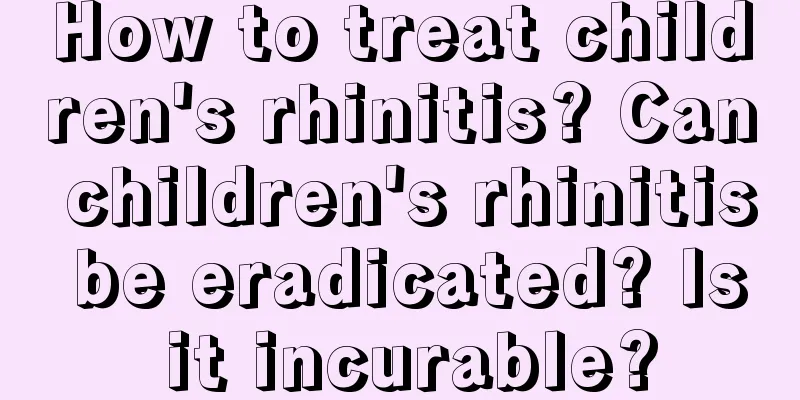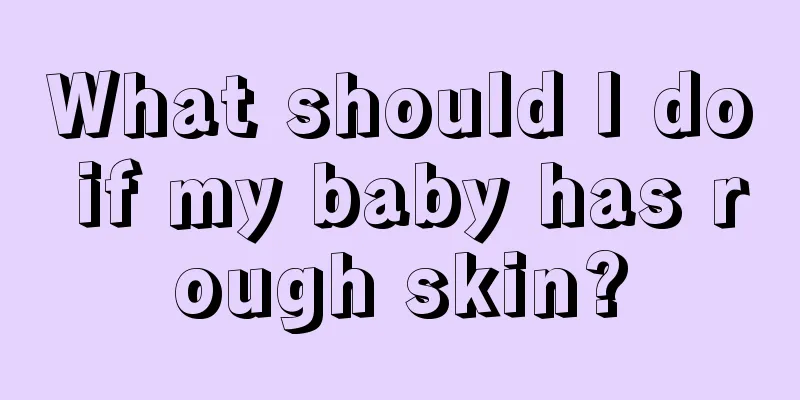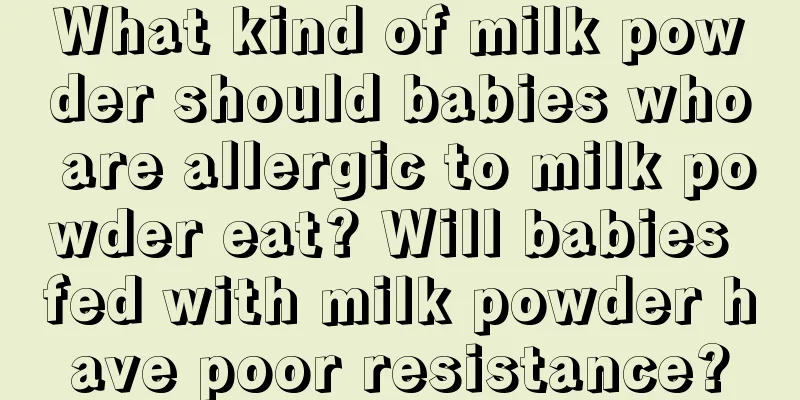How to treat children's rhinitis? Can children's rhinitis be eradicated? Is it incurable?

|
Rhinitis is a troublesome disease because it is difficult to cure, especially for children. However, if a child's rhinitis is not completely cured, the root of the disease will remain. So we need to understand how to treat and eradicate children's rhinitis? Is children's rhinitis incurable? How to treat children's rhinitis and eradicate itChildren's rhinitis cannot be cured. Most diseases cannot be cured. The most likely option is to cure it. Especially for rhinitis, if it is acute rhinitis, it can be cured; if the patient's resistance is reduced, it may recur frequently. Because acute rhinitis is also an upper respiratory tract infection, referred to as a cold, whether it is a child or an adult, it can only improve the patient's symptoms to achieve clinical cure. If it is chronic rhinitis or other chronic diseases, it is even more difficult to cure. When acute rhinitis occurs, it should be treated in time to avoid developing into chronic rhinitis and being unable to be cured. Whether children's rhinitis can be cured depends on the type of rhinitis. If a child suffers from acute rhinitis caused by a viral infection, it can be completely cured under normal circumstances. Let the child drink more water, eat a light diet, and take antiviral drugs such as pediatric phentermine granules. If it is allergic rhinitis, it is difficult to completely control it because it has a certain relationship with the constitution. It is recommended to go to a regular hospital for testing and allergen screening. Avoid allergens in life and use antiallergic drugs for treatment. Is rhinitis in children incurable?There are many types of rhinitis in children, the most common of which is acute rhinitis, which is also a cold. The symptoms of acute rhinitis include nasal congestion and runny nose, which can usually heal on their own in about a week. As long as there is no fever, no special medication is generally required. Another common type of rhinitis in children is allergic rhinitis, which is generally related to genetics. Certain anti-allergic treatments can achieve better results, but allergic rhinitis is prone to recurrence. Through allergen testing, clear allergens are found. First, try to avoid contact with allergens; in addition, desensitization therapy can be considered. Desensitization therapy can theoretically achieve the purpose of cure, but desensitization therapy usually takes 3 years, and sometimes the effect is not very satisfactory. Therefore, clinically, if the drug treatment is effective, desensitization therapy may not be performed. In addition, children's allergic rhinitis may heal itself as they gradually mature, but this is not certain. Can rhinitis be passed on to children?Rhinitis is a chronic inflammation inside the nasal cavity. If it is not allergic, it is not contagious. Therefore, parents can rest assured that their rhinitis will not be passed on to their children, and they can rest assured to have the next generation. But if the parents' rhinitis is allergic, it is contagious to a certain extent. It is not that rhinitis itself is hereditary, but that the allergic constitution will be inherited by the child. However, the inheritance rate of allergic rhinitis is not 100%, which means that a small part of the children will be inherited, so parents should not worry too much, and they can still have children normally. In order to reduce the chance of inheritance, parents with allergic constitutions must strengthen their bodies and improve their physical fitness before preparing for pregnancy. In daily diet, you must pay attention to increasing nutrition and eat more milk, lean meat, fresh vegetables and other foods. Reduce the intake of foods that are prone to allergies, such as seafood, eggs, mangoes, shrimps, etc. And pay attention to reducing the chance of contact with allergens. Try to wear a mask when going out to reduce the chance of allergens entering the respiratory tract. What symptoms does rhinitis causeRhinitis is mainly an inflammation of the nasal mucosa. The symptoms of rhinitis are mainly nasal congestion and runny nose. This nasal discharge may be serous, mucous or mucopurulent. In addition to these symptoms, there may also be symptoms such as loss of smell, stuffy head, headache and other symptoms. Some patients may have a symptom of nasal congestion and nasal sound. When this degree is reached, it is often accompanied by the appearance of sinus inflammation, because rhinitis and sinus inflammation cannot be separated. There are also some special rhinitis, such as allergic rhinitis, which has a lot of symptoms of sneezing and clear nasal discharge. Then patients with atrophic rhinitis may have a large number of purulent masses in the nasal cavity, and then symptoms of smelly nose. Therefore, the clinical manifestations of different rhinitis are also different. |
<<: What is the best way to treat children's rhinitis? What causes children's rhinitis?
>>: What are the symptoms of rhinitis in children? The harm and severity of rhinitis in children
Recommend
How can parents strengthen parent-child bonding during holidays?
In the process of growing up, sufficient interact...
How are Shishuang diapers? Real evaluation of Shishuang diapers
Diapers are an indispensable item for every baby....
Will there be two lines on the pregnancy test stick if it is left for a long time? Will leaving the pregnancy test stick for a long time affect the result?
Generally speaking, if the pregnancy test stick i...
Does hair dyeing affect pregnancy? What effects does hair dyeing have on pregnant women?
I believe everyone is also aware that hair dyes c...
How to choose newborn pajamas? Pay attention to 6 key points
Newborn babies are very fragile, and they need to...
Is it normal for a 12-year-old boy to have body odor? What should I do if my 12-year-old boy has a strong body odor?
A 12-year-old boy loves sports, but once he sweat...
How to strengthen the education of children who are impetuous and impatient? How to do psychological education for children?
The issue of children's education has always ...
How to help your baby fall asleep on his own? Talk about infant sleep
The most troublesome thing for parents is the sle...
How to judge milk powder indigestion? Do you need to change milk powder if you have indigestion?
There are many reasons for baby's indigestion...
Can I eat green oranges while breastfeeding? Can I eat oranges while breastfeeding?
Oranges are a popular fruit in autumn, and many p...
Can babies with constipation take probiotics to treat it? What probiotics can babies with constipation take?
Babies usually have very fragile stomachs, so if ...
Can pregnant women eat barbecue? You can still eat barbecue occasionally during pregnancy.
Barbecue is a kind of snack food that everyone li...
What are the dangers of children crossing their legs?
Many people like to cross their legs involuntaril...
What foods can’t be eaten during breastfeeding? What should I do if my baby can’t finish the milk?
Everyone should know that it is better for childr...
How long can I take a bath after a caesarean section? The correct way to take a bath after a caesarean section and the precautions
Giving birth can be divided into natural birth an...









